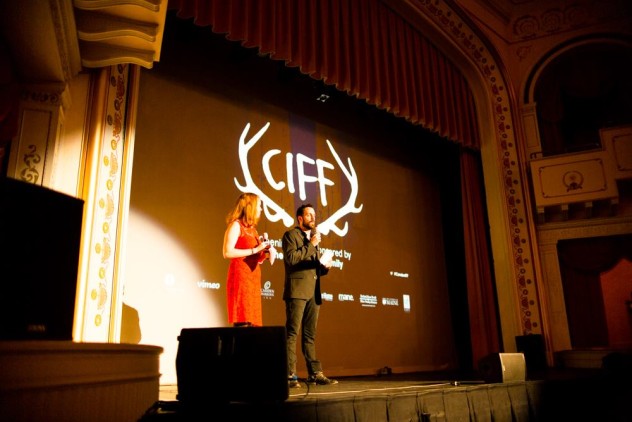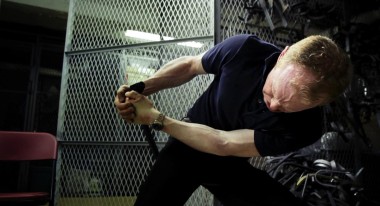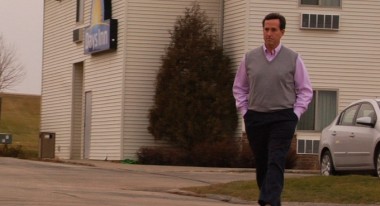 Back to selection
Back to selection
In Mid-Coast Maine, Documentaries Take Center Stage: The 2013 Camden International Film Festival

Christened Megunticook (“great swells of the sea”) by the long eradicated Penobscot Abenaki native American tribe that first lived in the region before it took turns being in the hands of the French and British during colonial times, the town of Camden, Maine is these days primarily a summering community for the northeast’s wealthy; its tiny population of just over 4,000 triples in size between Memorial and Labor Days. No wonder — the natural beauty of the place is quite stunning. It’s rolling hills and mountains, those great swells of the sea the PA’s were referring to, are covered in lush forests. They provide other worldly views of the sea. Although fishing is an industry that still has some sway in the area, which includes the surrounding towns of Rockport and Rockland, tourist leisure is clearly the order of the day as evidenced by the generous number of yachts and haute eateries that line the harbors and main streets of Knox County. Ex-Sundance programming guru and current Tribeca Enterprises chief Geoff Gilmore once remarked that the last thing the film world needs is another resort town festival. I’m not sure if he’s been up to Camden yet, but I suspect if he did he might change his tune.
Not that it necessarily should, but in it’s ninth year under the stewardship of festival founder, executive director and programmer Ben Fowlie, the festival doesn’t aspire to compete for premieres with doc circuits heavyweights such as IDFA or CPH:DOX, nor does it yet have the notoriety of fellow US non-fiction leading lights such as True/False or AFI Docs. Given the quality of its selection and the burgeoning of its reputation among filmmakers however, that may not be the case for much longer. Over the course of four days, CIFF manages to present a pair of doc pitch forums, one sponsored by the New York Times, while unfurling a meticulously crafted selection of 70 documentary films from several dozen countries across venues in Camden and its rocky neighbors, pulling generously from market festivals and less known destination spots in the documentary universe to cull together a program that is wide ranging yet curatorial, generous and yet just the right size for this sleepy town where many restaurants stop serving food at 9pm on a weekend night and most of the audience members are sporting silver hair. Not that you’d glean that from the relatively raucous, installation-like nightly parties, complete with tire swings and teepees in elegantly converted rustic barns and waterfront industrial spaces.
The festival opened with Sundance favorite Cutie and the Boxer and closed with the controversial, nuclear energy fear-dispeller Pandora’s Promise. Both have gone unseen by yours truly (there are only so many hours in the day), as well as the top prize winner The Genius of Marian, Banker White and Anna Fitch’s exploration of Alzheimer’s in two generations of the White family. Both White’s mother, who was on hand for his screening and is his principle subject, as well as his deceased grandmother, herself a notable author, have suffered from the disease. White was visibly moved upon receiving the award from Fowlie on closing night, but the moment was not without levity; sitting in the mezzanine level of Camden’s Opera House, he had the prize, an orange buoy with the CIFF logo painted on it, thrown up to him from the stage! That, in a nutshell, is the spirit of CIFF; improvisational yet classy.
Highlights from the selection certainly include Chico Pereira’s aestheticized within an inch of it’s life psuedo doc Pablo’s Winter, a by turns grim and humorous film, full of takes that are locked down and lugubrious but satisfyingly so. The title character is a vulgarian and a heart disease survivor who, despite stern warnings from his doctors, still puffs on cigars, his health an afterthought. The film isn’t quite as funny as it’d like to be and Pablo doesn’t earn our sentiments so easily; in real life, being this up close to sick, self-destructive middle-aged and elderly men who refuse to change their ways, however gregarious they are or how little life has left to offer them, isn’t as much fun as Pereira would indicate in his sleek frames, ones that do their best to give Pablo an existential coolness that would be an affront if it wasn’t done with such deftness and skill.
Ben Nabors’ SXSW Grand Jury prize winner William and the Windmill tells the unforgettable, not-as-simple-as-it-seems story of Malawi teenager William Kamkwamba. This guy is something else. Too poor to attend school, he taught himself how to build windmills, ones which generate a sizable amount of electricity for his family. Nabors’ doc details the way in which this incredible young man finds a small amount of fame in the West due to his efforts and the way in which that fame, and the Western do-gooder money that comes with it, end up being, like so much African aid, more of a double-edged sword than one would initially imagine. Consistently surprising and genuinely moving, it’ll make you ask questions about aid and the responsibility of those fortunate enough to be in the position to give it that have no easy answers.

Among my favorite films in the program, Dave Carroll’s Bending Steel was perhaps the most genuinely surprising things I encountered while in Camden, save that amazing peanut butter, jelly and duck (yes, duck!) sandwich I snagged at Shepherd’s Pie in Rockport. It took home a couple of prizes, Vimeo’s Emerging Cinematic Vision Award and a share of the audience award (it tied with Jillian Schlesinger’s precocious female sailor doc Maidentrip). Carroll’s film is, as its awards would indicate, both a crowd pleaser and a formally arresting non-fiction work, a movie that sneaks up on you; it stays in your system longer than you might think at first. It chronicles the life and times of Chris Schnoeck, a diminutive, alabaster-skinned, socially awkward strongman from the New York metropolitan area who, size be damned, does just what the title indicates as a life pursuit. Perhaps it’s even more than that; his entire identity and sense of self-worth is bound up in how effectively he can bend steel and it’s to Carroll’s great credit that he finds a satisfying aesthetic, one that darts between vérité, casual interview, Chris’ own recorded practices, a touch of animation and thoughtfully chosen B-roll to bring this man and his world to rich life.
Schnoeck’s staid, seemingly middle-class parents, who it was revealed in the post-screening Q&A have never seen this remarkably moving film about their son, don’t like how he’s chosen to spend his spare time, even if his day job as a physical trainer, glimpsed at the beginning, affords him some pretty nice digs apparently; he spends much of the movie speaking about himself and the physical rigor involved in pulling seemingly inhuman feats of strength while perched on a nice leather chair in a handsome room we assume is his, smoking a cigar. We see him fail frequently, both with various private attempts to bend even more menacing pieces of steel and to be an effective presenter of his work, be it at church socials or bars. Not a born showman like so many of the preternaturally endowed strongmen, many of whom (and it seems we meet everyone relevant on the current scene at one point or another) do things like ripping decks of cards in half with their fingers or bending dimes or nickels with their teeth. Chris has a quiet desperation about him and isn’t particularly charming, but something about Schnoeck makes you want to root for him and the movie trades on this effectively, building to a climatic performance at post-Hurricane Sandy Coney Island — appropriate given its place in the history of showcasing freakish strongmen — in which Schnoeck attempted to bend a personal record two-inch thick piece of steel. I won’t reveal whether he was successful, but it proves to be one of the more cathartic finishes I’ve encountered in quite a while; the whole audience burst into applause.
Cinedigm exec and Reverse Shot honcho Jeff Reichert and Filmmaker magazine contributor Farihah Zaman’s Remote Area Medical, which chronicles four days at a gargantuan pop-up clinic, is certainly not a crowdpleaser by any stretch; it’s tough to watch desperately poor Appalachians who haven’t had dental work in generations get their teeth violently pulled out on the tarmac of the Bristol Motor Speedway. Harder still to watch the inhumanity of our all too expensive and uncompetitive health care system in its less gruesome but no less telling details; the medical issues ignored out of financial necessity that have only grown worse by the time they’re treated (one woman who has a smoky spot in her lungs show up on an X-ray leaves saying, “We’ll just leave it in the hands of the good Lord”) and the exorbitantly long lines, forming nights in advance outside of one of NASCAR’s most hallowed tracks, all for the most rudimentary of care being provided by the non-profit from which the movie gained its title. I suspect that most audiences will leave feeling that they’ve encountered an essential document here, and a handsome one too (the lensing, a mix of vérité and interview, is universally and unusually superb). In a season in which our never ending national debate about whether the richest country in the history of the would ought to make adequate and timely medical care when needed a right, Remote Area Medical is the perfect antidote for the bizarre and dangerous new turn the fate of progressive health care has taken of late.

The 2012 candidates for the Republican Presidential nomination — in other words the people who vied to be the standard bearer for those responsible for the government shutdown spurred by opposition to the Affordable Care Act — were photogenic, prone to gaffes: a documentarian’s wet dream of a cast. The GOP primaries offered us ambitious charlatans and lunatics eager to put themselves of display, finding room after room of deluded or poorly informed or simply mean-spirited white people to entertain and cajole. The entire primary season, while not as entertaining as it could have been (how can people with such depressing and shortsighted views of the world ever sustain much humor?), offered enough drama for five movies and it is my great pleasure to inform you that veteran docmaker A.J. Schnack’s Causus, a profile of six months with the Romneys and Santorums and Bachmanns and Cains and Pauls in Iowa, is one of the great political non-fiction films of our time, a worthy successor to Robert Drew’s Primary and Hegedus/Pennebaker’s The War Room.
With startlingly intimate access to all of the key candidates, Schnack retells the story of one of the wildest primary seasons in memory, uncovering a lot of what we would expect (ignorance and bigotry among the country folk, cynicism masked as patriotism from the candidates and their spouses) along with much we wouldn’t — who knew Newt Gingrich was such a zoo nerd? The film chronicles many of the best gotcha moments from the trail; we see new, firsthand footage of Romney claiming “Corporations are people,” for instance. Yet the personalities of the figures are what shine through the most. Dr. Ron Paul, this author’s avowed favorite among that paltry field, comes off well in his brief appearance, although he simply is incapable of closing a minivan door, his dutiful son Rand having to operate the auto-door for him in one of the movie’s great comic set-pieces. Santorum emerges, somewhat queasily, as the hero of the story; he did win the caucus after all, on a recount, in what seemed at the time to be a minor miracle. But the film documents his everyman vibe, his diligent work ethic, his sensitivity, his love of family and his suffering of fools with aplomb. He’s also never seen a food spread he didn’t want to devour. It’s full of humorous bits like this amidst its picture of our political discourse in freefall; whether its Newt Gingrich getting mic-checked by Occupiers only to then, 10 minutes later, flirt with female students as he leaves U of I, Herman Cain’s exuberance at discovering the existence of another black Republican not named Allen West or Colin Powell, or Michele Bachmann waving to her non-existent onlookers for the camera, only revealed after a brisk and expert pan. These clowns make for a terrific night at the cinema, as long as they’re not in charge.
